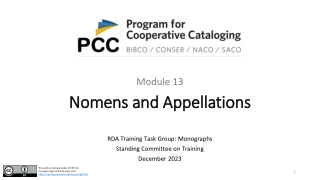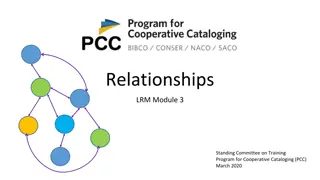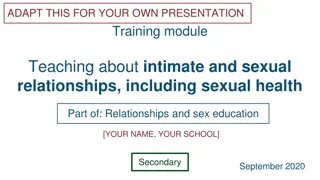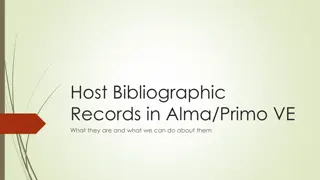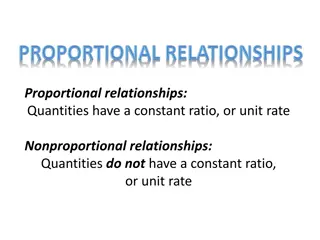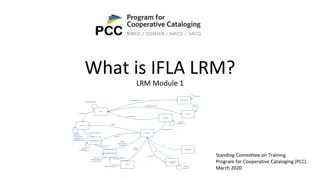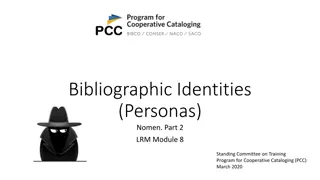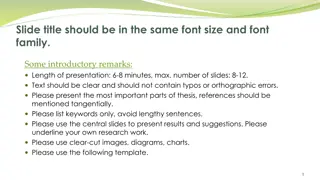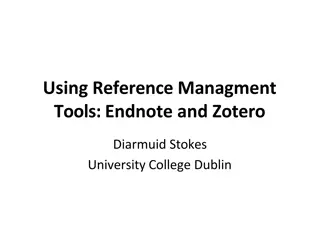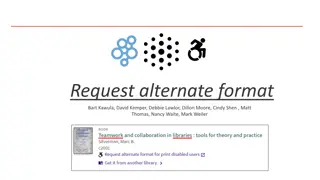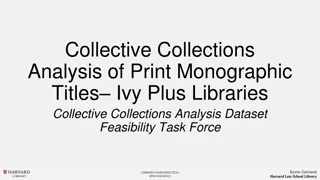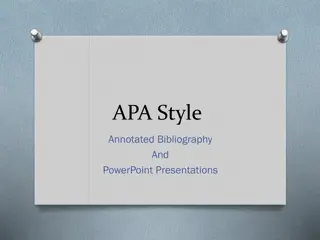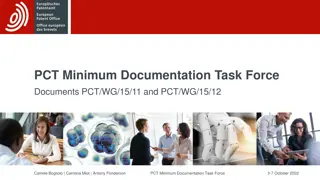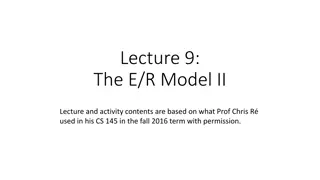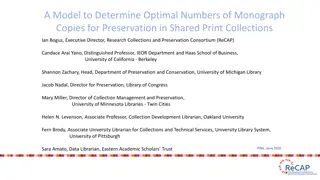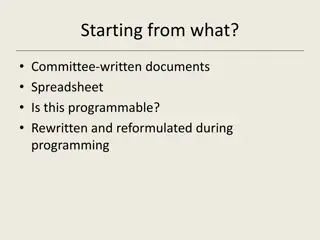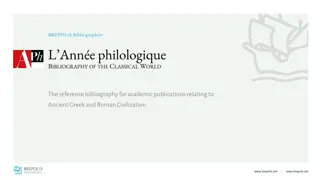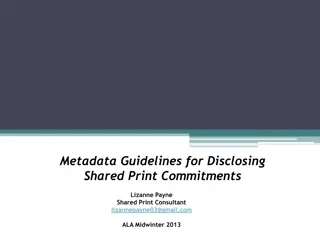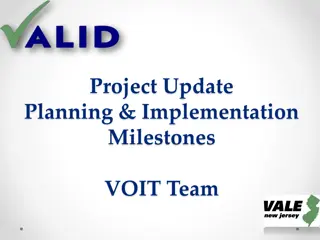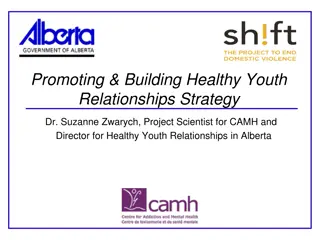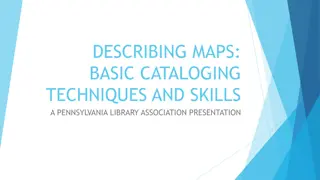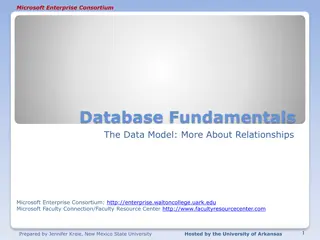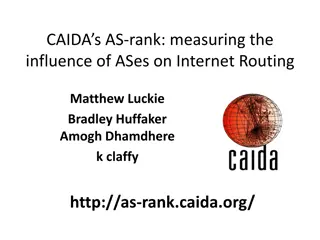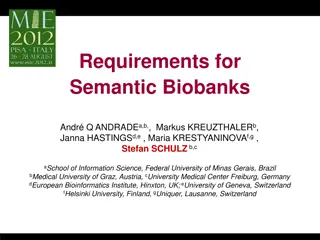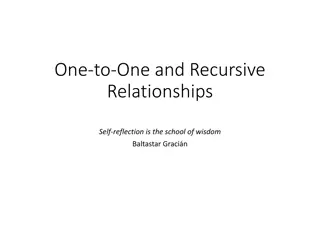Understanding Nomen Entity in RDA Training Module
Explore the development of the Nomen entity in RDA training, differentiating nomen and nomen strings, identifying RDA elements for describing a nomen, and examining relationship elements linking RDA entities with nomens. Delve into the origins and attributes of nomens as defined in FRBR and FRAD sta
1 views • 48 slides
Standards and Formats in Bibliographic Information Exchange
International Standard Bibliographic Description (ISBD) defines rules for creating standardized bibliographic descriptions, facilitating information retrieval in libraries. MARC 21 Format for Bibliographic Data serves as a carrier for bibliographic information across various material types. ISO 2709
1 views • 13 slides
Importance of Relationships in Professional Learning Framework
Relationships are crucial for the wellbeing, learning, and behavior of Scotland's learners. This resource, designed by @ESInclusionTeam, emphasizes the significance of fostering strong, trusting relationships between educators and learners. It provides slides for facilitating professional learning s
4 views • 21 slides
Using BIBFRAME in a mixed MARC environment
Delve into the intricate world of utilizing BIBFRAME alongside MARC standards at the National Library of Sweden. Discover the benefits of a BIBFRAME catalog, the challenges of maintaining dual terminology, and the ongoing shift towards linked data integration. Gain insights into cataloging practices
0 views • 10 slides
Understanding Relationships in Bibliographic Universe
Relationships in bibliographic universe connect entities, providing context through entity-relationship models like IFLA LRM. Learn key terms, principles, and diagrams to identify relationships defined in IFLA LRM. Explore domains, ranges, inverse, recursive, and symmetric relationships. Enhance you
0 views • 23 slides
Training Module on Intimate and Sexual Relationships in Secondary Schools
This training module on intimate and sexual relationships in secondary schools covers teaching strategies, safeguarding, and examples of good practice. It aims to enhance educators' confidence in addressing intimate relationships and sexual health, aligning with statutory guidance. The module emphas
0 views • 105 slides
Understanding Host Bibliographic Records in Alma/Primo VE
Explore the concept of Host Bibliographic Records in the Alma/Primo VE system, which address the issue of linking single items to multiple bibliographic records. Learn how host bibs work, their creation during data migration, implications for library services, and the various types of host bibs used
1 views • 24 slides
Importance of Relationships & Sex Education in Primary Schools
Effective Relationships and Sex Education (RSE) in primary schools is crucial in addressing the changing dynamics of the modern world. With updated curriculum guidelines, children are taught age-appropriate information on growth, reproduction, and relationships. RSE aims to equip students with essen
0 views • 17 slides
Understanding Proportional and Nonproportional Relationships in Mathematics
Proportional relationships involve quantities having a constant ratio or unit rate, while nonproportional relationships lack this constant ratio. By examining examples such as earnings from babysitting and costs of movie rentals, we can grasp the differences between these two types of relationships.
2 views • 6 slides
Building Respectful Relationships and Responsive Engagement in Early Childhood
Responsive engagement in early childhood education involves building respectful relationships with children and families, emphasizing their strengths and interests. Two case studies highlight the importance of being attuned to children's needs and promoting positive relationships between parents and
0 views • 20 slides
Understanding Relationships in Business: Stakeholders, Dynamics, and Cooperation
Exploring the intricate web of relationships in business, this content delves into the dynamics between stakeholders such as workers, managers, entrepreneurs, investors, and customers. It discusses the nuances of cooperative and competitive relationships, dependent relationships, and dynamic interac
0 views • 23 slides
Understanding IFLA LRM: A Conceptual Reference Model
IFLA LRM, created by the International Federation of Library Associations and Institutions, consolidates FRBR, FRAD, and FRSAD models into a coherent framework. It aims to structure bibliographic data logically and inclusively, focusing on end-user needs and tasks. The model describes interrelated e
0 views • 11 slides
Understanding Bibliographic Identities and Nomen Clusters in Cataloging
Explore the concept of bibliographic identities, factors influencing the use of Nomens for individuals, and the relationship between Nomens and cataloging rules. Learn how one entity may have multiple Nomens and the significance of context in distinguishing between distinct bibliographic identities.
0 views • 12 slides
Environmental Management Thesis at University of Debrecen
Environmental Engineering MSc student at University of Debrecen presents a thesis focusing on environmental management, discussing the problem, goals, material and methods, results, and suggestions. The study covers bibliographic background, legislative aspects, and concludes with practical recommen
0 views • 12 slides
Comparing EndNote Web and Zotero Reference Management Tools
Reference management software like EndNote Web and Zotero offer scholars and authors the ability to record and use bibliographic citations effectively. These tools enable easy collaboration, sharing of references, and curating collections of references. While EndNote Web is widely used and integrate
0 views • 22 slides
Visual Highlights from British Library: Pin the Tail on the Donkey & Tillett: Bibliographic Relationships
Explore captivating images showcasing the games "Pin the Tail on the Donkey" and delve into bibliographic relationships with Tillett. Witness the fun and scholarly side of these subjects through vibrant visuals. Perfect for those interested in cultural traditions and library resources.
0 views • 4 slides
Enhancing Library Accessibility: Request Alternate Formats for Print Disabled Users
This project focuses on providing accessible library services for print-disabled users by allowing them to request alternate formats, reducing their workload and promoting awareness of available services. The workflow involves users accessing the library website, logging in with ACE tokens, populati
1 views • 24 slides
Cataloging Training Course Overview: FRBR, RDA, BSR
Delve into a comprehensive cataloging training course covering key topics such as FRBR concepts, RDA cataloging instructions, and BSR standards. Each day focuses on specific learning objectives to enhance your understanding of bibliographic records creation. Embrace the journey of mastering FRBR and
0 views • 84 slides
Collective Collections Analysis of Print Monographic Titles in Ivy Plus Libraries
The Ivy Plus Libraries are embarking on a project to collect, normalize, and analyze bibliographic and holdings records of single-part print monographs added to their catalogs between 2013-2017. The Task Force aims to enhance collaboration, streamline acquisitions, develop purchasing programs, and o
1 views • 6 slides
Mastering APA Style: Annotated Bibliographies & Presentations
Exploring the world of APA style through annotated bibliographies and PowerPoint presentations. Learn how to combine bibliographic references with annotations, summarize sources, analyze their relevance, and reflect on their impact. Enhance your research and writing skills with these essential tools
0 views • 23 slides
Unlocking the Power of Complex Searches with CCL Queries
Construct precise search filters using Common Command Language (CCL) queries to efficiently list records based on specific characteristics. Explore the commands and access points for creating custom search filters with CQL in Polaris PowerPAC. Learn key codes and tips to enhance your search capabili
1 views • 8 slides
Human Disease Symptom Network: Understanding Disease Relationships Through Symptoms and Genes
The Human Disease Symptom Network (HSDN) is constructed using a large-scale medical bibliographic records database to form a network of human diseases based on symptom similarities. By integrating disease-gene associations and protein-protein interaction data, correlations between symptom similarity
0 views • 37 slides
PCT Minimum Documentation Task Force Updates and Progress Report
The PCT Minimum Documentation Task Force has been working diligently to modernize and standardize PCT minimum documentation for the digital era. Objectives include reviewing patent and non-patent literature, setting criteria for national patent collections, and improving bibliographic data. Challeng
0 views • 28 slides
Understanding E/R Model Considerations and Relationships
Explore the E/R model considerations and relationships like multiplicity, multi-way, conversion to SQL, and more. Learn about modeling purchase relationships and the significance of arrows in multi-way relationships. Understand the challenges in expressing constraints like every person shopping at m
0 views • 29 slides
Optimal Monograph Preservation in Shared Print Collections
A model is proposed by Ian Bogus, Candace Arai Yano, Shannon Zachary, Jacob Nadal, Mary Miller, Helen N. Levenson, Fern Brody, and Sara Amato to determine the ideal number of monograph copies for preservation in shared print collections. The model considers variables such as on-shelf probability, bi
0 views • 11 slides
Tool for Implementing Committee Reports in OCLC Connexion
This presentation uncovers the development process of a tool designed to implement committee reports within OCLC Connexion. From transforming spreadsheets to programming to final outcomes, each step of the tool's internal operation and capabilities is explained. The tool targets specific elements in
0 views • 31 slides
Comprehensive Bibliography on Ancient Greek and Roman Civilization
Explore L'Année Philologique, an international bibliography covering a wide range of subjects related to Ancient Greek and Roman civilizations. With over 900,000 bibliographic records and 575,000 book review references, it serves as a valuable resource for academic research. The database includes p
0 views • 8 slides
Understanding MARC Tags 7XX, 8XX, 9XX in Library Cataloging
Learn about the application of MARC tags 7XX, 8XX, and 9XX in library cataloging. Explore how these tags are utilized for added entries, series data, and internal use within bibliographic records. Discover the significance of MARC tags 700-730 for establishing authorized access points, listing addit
0 views • 26 slides
Comprehensive Relationships, Sex, and Health Education Syllabus Presentation
This syllabus presentation covers six main areas including relationships, consent, human sexuality, online safety, and sex education. It aims to educate students on understanding healthy relationships, consent in all types of relationships, human sexuality, online safety, and sex education facts and
0 views • 12 slides
The Importance of Effective Communication in Healthy Relationships
This module from the Welcoming Warriors Home Manual focuses on helping veterans understand healthy relationships and effective communication skills to nurture positive connections with their partners. It addresses conflict resolution, cultivating healthy relationships, repairing relationships after
0 views • 11 slides
Metadata Guidelines for Disclosing Shared Print Commitments
Shared Print Metadata Guidelines aim to establish new Shared Print Institution Symbols and add them to bibliographic records for resource sharing. These guidelines involve creating MARC Local Holdings Records (LHRs) to document archiving commitments for journals. The Shared Print initiative supports
1 views • 12 slides
Library Consortium VOIT Implementation Update
Library consortium VOIT team members from various universities in New Jersey collaborate on governance, bibliographic control, and metadata implementation. They focus on investigating specific issues and devising specifications to enhance library systems. Accomplishments in FY2013 include recommendi
0 views • 14 slides
Understanding and Promoting Healthy Youth Relationships for Preventing Domestic Violence
Creating transformational change through primary prevention strategies is crucial to ending domestic violence. The SHIFT project focuses on stopping first-time victimization and perpetration by promoting healthy relationships, families, and communities. Initiatives like The Fourth R: Healthy Relatio
0 views • 29 slides
Exploring Map Cataloging Techniques and Challenges
Discover the essential cataloging tools and resources for managing cartographic materials, including descriptive areas of bibliographic records, title selection, scale considerations, and physical descriptions. Learn about the unique characteristics of map cataloging, the differences from other form
0 views • 50 slides
Understanding Microsoft Enterprise Consortium Database Relationships
Explore the fundamentals of data models, relationships, and cardinality in the Microsoft Enterprise Consortium Database. Learn about entities, attributes, identifiers, and the different types of relationships like one-to-many, many-to-many, and one-to-one. Gain insights into the degree of relationsh
0 views • 10 slides
Understanding AS Relationships in Internet Routing
Exploring the complex ecosystem of AS relationships in Internet routing, the CAIDA's AS-rank project measures the influence of ASes through customer cones and validates the relationships for accuracy. The ground truth summary provides insights into the types and distribution of AS relationships, hig
0 views • 14 slides
Integrating ArchivesSpace with Voyager: Exploring MARC and Beyond
Exploring the integration of ArchivesSpace and Voyager, focusing on repurposing finding aid information as bibliographic descriptions. Discusses steps taken, including MARC record review, NYU's MARC export plugin, local transformation files, and the use of MarcEdit. The goal is automation with ongoi
0 views • 7 slides
Requirements for Semantic Biobanks and Global Biobank Data Retrieval
Explore the critical aspects of semantic interoperability in biobanking, highlighting the need for formal ontologies, comprehensive annotations, and model of meaning data. The (Generalized) Biomedical Retrieval Scenario underscores the importance of effective resource retrieval based on content-base
0 views • 16 slides
Overview of RDA: Resource Description and Access
An in-depth look at RDA (Resource Description and Access), covering its origins, development by the Joint Steering Committee, transition from AACR3, and key concepts such as representation principles and data sharing beyond libraries. The test period of RDA Toolkit revealed its impact with over 10,0
0 views • 27 slides
Understanding One-to-One and Recursive Relationships in Data Modeling
Explore the concepts of one-to-one and recursive relationships in data modeling through images and explanations. Learn about labeling relationships, mapping foreign keys, and creating tables in MySQL Workbench. Dive into examples showcasing 1:1 relationships and recursive relationships, with insight
0 views • 43 slides
